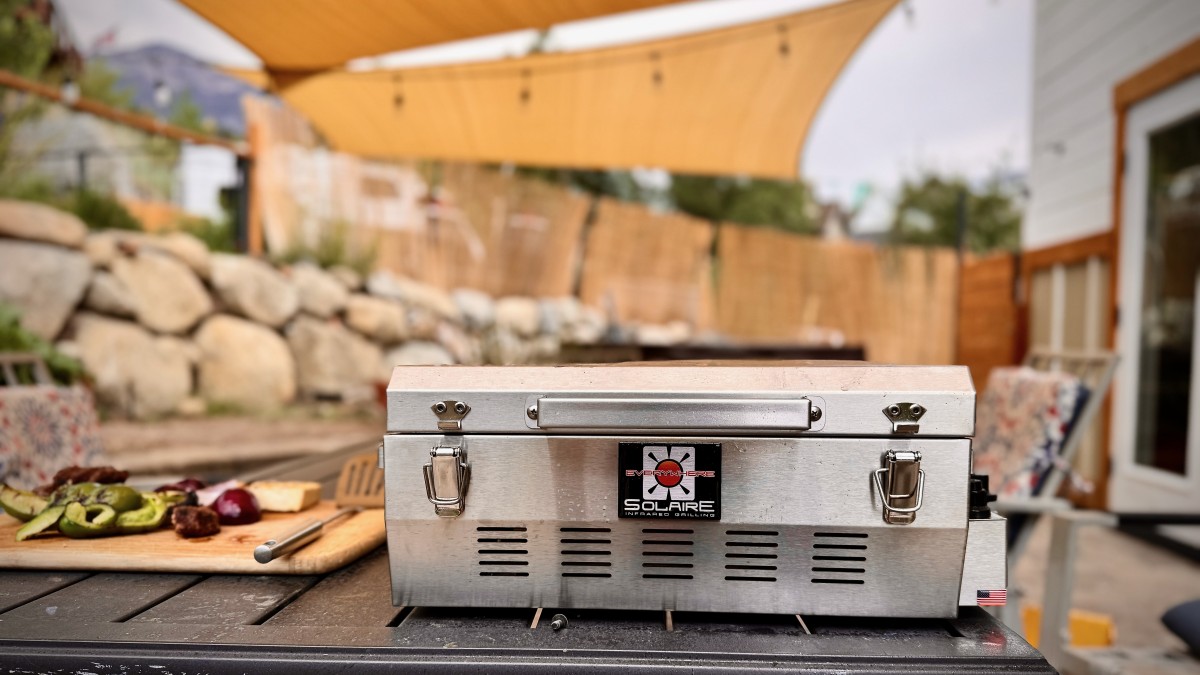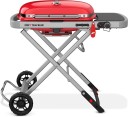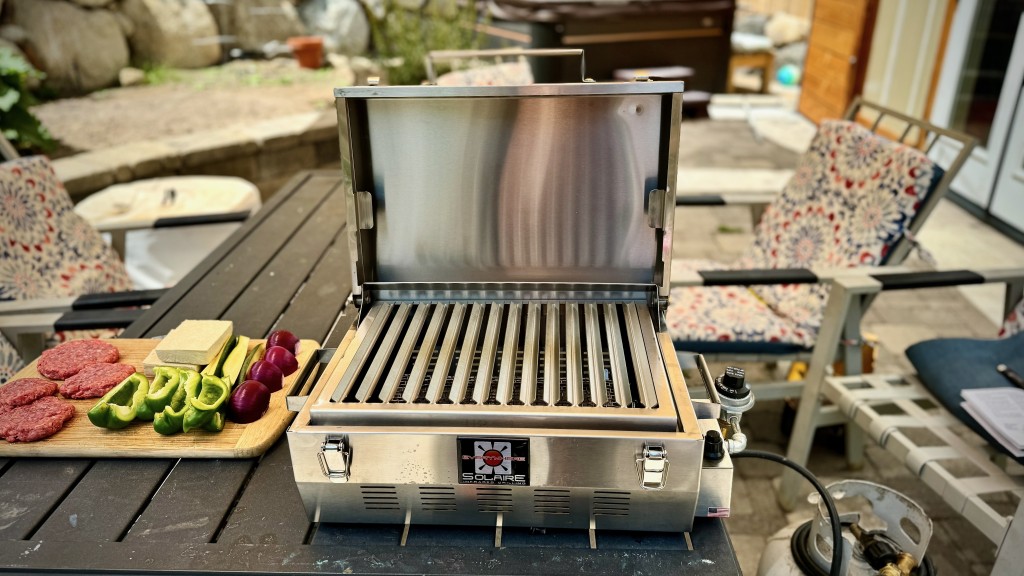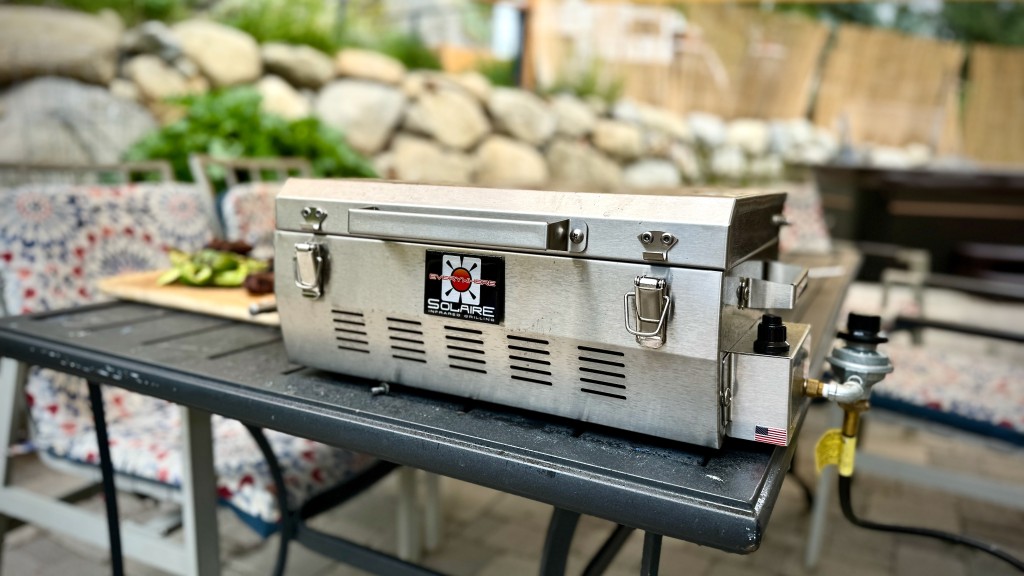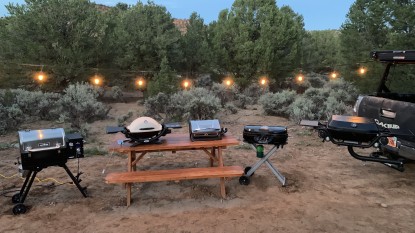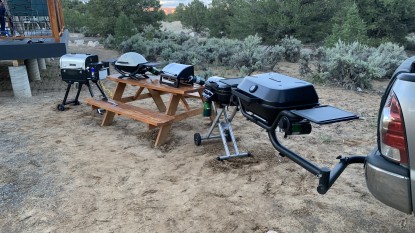Our Verdict
Compare to Similar Products
 This Product
Solaire Everywhere | |||||
|---|---|---|---|---|---|
| Awards | Best Infrared Grill | Best Overall Portable Grill | Best Cooking Performance for the Money | Best Tabletop Grill | Best Value in a Smaller Grill |
| Price | $399 List $399.00 at Amazon | $399 List Check Price at Amazon | $170 List Check Price at Amazon | $259 List $253.99 at Amazon | $120 List $119.99 at Amazon |
Overall Score  |
|||||
| Star Rating | |||||
| Bottom Line | If you dig infrared grilling, this is among the best portable options we've tested | Even though it's expensive, this grill exceeded expectations and received high scores in every testing metric | A high-performing propane grill that features an aesthetic and durable stainless steel design along with high output power and excellent control | A thoughtfully-designed grill that has everything you need, and then some | Almost too powerful for its size, this hearty grill specializes in searing steaks |
| Rating Categories | Solaire Everywhere | Weber Traveler | Cuisinart CGG-306 C... | Weber Q 1200 | Cuisinart Grillster |
| Output Power (25%) | |||||
| Control (25%) | |||||
| Portability (20%) | |||||
| Cooking Area (20%) | |||||
| Wind Resistance (10%) | |||||
| Specs | Solaire Everywhere | Weber Traveler | Cuisinart CGG-306 C... | Weber Q 1200 | Cuisinart Grillster |
| Heat/Power Source | Liquid propane / infrared | Liquid propane | Liquid propane | Liquid propane | Liquid propane |
| Total BTU | 14,000 | 13,000 | 20,000 | 8,500 | 8,000 |
| Weight (Per Manufacturer) | 15.0 lbs | 49 lbs | 22 lbs | 31 lbs | 10.0 lbs |
| Measured Cooking Surface Area | 135 sq in | 390.0 sq in | 275.0 sq in | 189.0 sq in | 148 sq in |
| Number of Burners | 1 | 1 | 2 | 1 | 1 |
| Grill material | Stainless steel | Porcelain-enameled cast iron | Stainless steel | Porcelain-enameled cast iron | Enameled steel |
| Measured Packed Size - Dimensions | 21.0"L x 13.0"D x 8.0"H | 44"L x 23"D x 13"H | 22.0"L x 14.0"D x 18.5"H | 26.0"L x 15.0"D x 14.0"H (side tables closed) | 20.5"L x 12.0"D x 10.2"H |
| Measured Packed Size - Volume | 1.3 cu ft | 6.5 cu ft | 3.3 cu ft | 3.2 cu ft | 1.5 cu ft |
| Piezo Ignitor | Electric | Yes | Yes | Electric | Yes |
Our Analysis and Test Results
The Everywhere is the first portable infrared grill that we ever tested. This sort of infrared grilling is an entirely different propane-powered technology, and we have put it through its paces with various models. The biggest difference between the Everywhere and the other grills is the burner technology. Most of our comparisons here will be between infrared grilling and what we'll call “blue flame grilling.” Most propane grills, portable or otherwise, use “blue flame grilling.” The Everywhere uses a special “flame-free” ceramic burner. Other grills use a tube with holes in it as the burner. That tube burner can directly grill your food through a relatively open grate. That is “traditional” grilling. Blurring the lines are grills that have tubular burners that are placed further from the grate, so that when you crank up the heat, the flame very seldomly reaches your food. This latter type of grill is marketed as “infrared.” If your grill is infrared, you will likely know it from the branding. Aside from the differences between infrared and blue flame, the Everywhere features a well-made and compact design that is perfect for grilling on the go. Our primary notes below are related to the infrared grilling technology.
Performance Comparison
Output Power
The power of the Everywhere is indeed impressive. Their ceramic burners are known for generating a great deal of heat at a very rapid pace. Solaire claims 14,000 BTUs, and we don't doubt that. High heat output is the whole point of infrared cooking, and we found this grill to be our first choice for searing red meats such as steaks, burgers, etc., when you're after some grill marks on the outside with pink, juicy meat on the inside.
Inside the burner, the propane is pressurized, creating a sort of jet effect. The “flame” is orange, and the invisible heat is impressive. Now, this kind of power has its drawbacks and makes it very difficult to cook food like poultry, ribs, and veggies on a low and slow heat, allowing for enough time for the inside to cook without burning the exterior on the grate. That being said, no other grills that we tested, even the other infrared options, produce output power like the Everywhere. This grill is super efficient, hot, and ready to perfectly sear your steak in a matter of seconds.
Control
A traditional grill heats your food with both direct heat (infrared) and by heating the air under the grill lid (like an oven). The Everywhere uses just the direct infrared heating strategy, which means that meat will heat up and cook very, very fast. While grilling, the surface of the meat that is interacting with the grill grate will effectively form a vapor barrier of cooked flesh on the outside of the meat. This is what foodies talk about when they say, “The juices are sealed inside.” This is referred to as the searing process that is backed by science. By comparison, a traditional blue flame grill will sear the bottom of the meat while the top is exposed to a slower sort of cooking that allows for evaporation of the meat's juices before it can be flipped over and seared on the other side.
Theories aside, how does the Everywhere grill actually perform? After a very short learning curve (Solaire provides brief instructions to help you adapt to infrared grilling), the red meat we prepared on the Everywhere was indeed most excellent. It stayed noticeably more juicy than meat cooked on the other “blue flame” grills that we tested. Poultry and veggies were another story. It was very hard, even on the lowest setting, to not burn the outside while trying to make sure the food was cooked through. Not to say it can't be done, but the outside will get more charred than many would prefer. Slow-cooking country-style pork ribs didn't work at all. They just dried out. Veggies were similarly varied. Onions and peppers are good; they cooked quickly and got a tasty little char. Vegetables like mushrooms and beets are cooked best with a slower approach and aren't compatible with the high heat of the Everywhere grill. While not the highest-scoring grill in this metric, it does offer enough control to perfectly sear red meats at a very fast rate.
Portability
The Everywhere grill is Solaire's most compact and portable infrared grilling option. When it comes to overall bulk and weight, it is also amongst the top-performing compact grills that we tested. The case is well-built, solid, and clean. The grill measures 21 x 13 x 8 inches at its packed size and weighs a modest 15 pounds, making it easy to pack and carry to your next grilling location.
There are pros and cons when it comes to infrared technology and its portability. We couldn't help but notice the difference in consumption when it came to propane use, comparing infrared grilling options to traditional “blue flame” grills. On the Pro side, propane tanks are not drained as quickly using infrared as we have come to expect with traditional grills. Similarly, drippings are vaporized by the burner, so there is no accumulated grease to make a mess in your car. This makes such grills pretty handy when on the go. In the Cons column, we can't help but mention some concerns about the delicate ceramic burner that seems to have the potential for damage if faced with rough transport to a dispersed campsite. Though there seems to be the potential to crack, we have yet to encounter such problems during testing. But it is something to be aware of and a reminder to pack your Everywhere grill appropriately to avoid damage. Durability concerns aside, this grill is one of the more easily packed options available.
Cooking Area
The Everywhere grill is pretty darn small and compact. The 135-square-inch grilling surface is among the smallest grills that we tested, making it a great option when cooking for two people or grilling for a small group in separate courses.
If you're interested in searing red meat to perfection for you and a few friends at a time, this grill offers excellent performance but with minimal square footage. Just a couple of items to consider. While we were evaluating the cooking area, we couldn't help but notice that the cooking grate is constructed from unique, concave, v-shaped bars. The v-shaped design collects the dripping juices to produce steam, allowing your meat to remain moist without drying out. The only caveat to this design is that the bars are wide and can block some of the infrared heat from the surface of the meat. To optimize the infrared energy and allow more heat to reach the grate, the bars have large spaces between them. This can result in losing some of the smaller food items through the gaps. By comparison, other grills feature designs that don't allow food to fall through the gap.
Wind Resistance
As per Solaire's instructions (and the design of many infrared grills), the Everywhere grill is intended to be used with the lid open. The lid is simply there to contain things in transport and keep precipitation and dust out of the stowed and inactive grill. The lid is shallow. You couldn't close it over your food if you so desired.
By leaving the lid fully open, the grilling surface is exposed to the wind at all times. During our testing periods in the Teton mountains, as well as in the breezy Eastern Sierras, the wind had a dramatic effect on the food. If there is enough wind, your food won't really cook on the Everywhere. Though the burner itself is virtually impossible to blow out, all of the heat gets swept away from the top of your food by the wind. Again, well-built traditional grills do better in this category, and a “blue flame” grill that blows out is decidedly worse than the Solaire. However, a tight lid and efficient design will exceed any uncovered grill, no matter which flame type is used. That being said, this grill can be better protected at home, where you may better be able to limit its exposure to high winds. When grilling on-the-go, it can be more difficult to find a sheltered location that's best for utilizing the infrared grill technology. Wind resistance is more important in your portable grill than it is in your home grill, and therefore, portable infrared grills carry an extra burden.
Should You Buy the Solaire Everywhere?
Though infrared grilling technology still presents some learning opportunities so as to maximize grilling performance, our testing team agrees that this is the best option for searing red meats to perfection. This is an expensive grill that caters to the desires of those red meat connoisseurs who are willing to invest in a grill that can deliver a niche performance. If you're after a more all-around grill that offers better wind protection or a larger cooking surface to supply enough food for a small group, the Everywhere grill is not the best option for you. However, if you're after infrared grilling on the go, the Solaire Everywhere is our best recommendation for high performance in exchange for your investment.
What Other Portable Grills Should You Consider?
Infrared grilling is amazing when it is amazing, but there are also drawbacks. For those who aren't sure if they want to go this route and instead want a fantastic all-around tabletop grill, then the Weber Q 1200 is a favorite of our testing crew. For those interested in investing in a top-of-the-line standup grill option, the overall performance of the Weber Traveler simply can't be matched. If you're put off by the price tag attached to all of these grills, the Cuisinart Grillster is our choice for overall value. It is also a powerful little grill that is more than capable of searing steaks and red meat to order. Additionally, the compact and lightweight non-stick performance of the electric Elite Gourmet 12" offers excellent portability and solid performance available at an affordable price.


